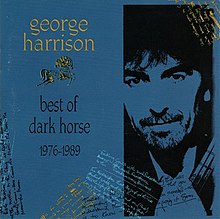Best of Dark Horse 1976–1989
| Best of Dark Horse 1976–1989 | ||||
|---|---|---|---|---|
 |
||||
| Greatest hits album by George Harrison | ||||
| Released | 17 October 1989 | |||
| Recorded | May 1976–July 1989 | |||
| Genre | Rock | |||
| Length | 60:26 | |||
| Label | Dark Horse | |||
| Producer | George Harrison, Ray Cooper, Jeff Lynne, Russ Titelman, Phil McDonald, Tom Scott | |||
| George Harrison chronology | ||||
|
||||
| Professional ratings | |
|---|---|
| Review scores | |
| Source | Rating |
| AllMusic | |
| Blender | |
| Robert Christgau | B– |
| Encyclopedia of Popular Music | |
| The Essential Rock Discography | 7/10 |
| Goldmine | "Recommended" |
| MusicHound | 3/5 |
| Q | |
Best of Dark Horse 1976–1989 is a compilation album by English musician George Harrison, released in October 1989. His second compilation, after the Capitol/EMI collection The Best of George Harrison (1976), it contains songs from Harrison's releases on his Dark Horse record label between 1976 and 1987. The album also includes a 1989 single, "Cheer Down", which was Harrison's contribution to the soundtrack of the film Lethal Weapon 2, and two tracks recorded specifically for the collection: "Poor Little Girl" and "Cockamamie Business". Despite the popularity of Harrison's work over this period – both as a solo artist with his Cloud Nine album (1987), and as a member of the Traveling Wilburys – the compilation failed to achieve commercial success.
Best of Dark Horse became out of print in the early 1990s, and it remained unavailable when Harrison's Dark Horse catalogue was reissued in 2004. It remains the only official release to include "Poor Little Girl" and "Cockamamie Business".
Rather than record a follow-up to his successful 1987 comeback album, Cloud Nine, in 1989, George Harrison chose to wait for his Traveling Wilburys bandmates – Jeff Lynne, Bob Dylan and Tom Petty – to become available to start work on a new album. In a July 1989 interview, he described the group's 1988 debut, Traveling Wilburys Vol. 1, as "one of the most enjoyable things I've done" and added: "I just have to wait for all the other Wilburys to finish being solo artists …" Harrison instead agreed to issue a greatest hits album, covering his work released on his own Dark Horse record label, from 1976's Thirty Three & 1/3 to Cloud Nine.
...
Wikipedia
